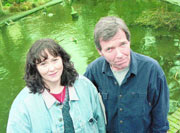BOYS GROWING UP in small towns typically dream of becoming the president, not a burr in the president’s britches. But former Environmental Protection Agency (EPA) ombudsman Robert Martin, a Makah tribal member born on the Olympic Peninsula—and a recent casualty of the Bush administration’s blitzkrieg on environmental regulation—kept stirring up trouble on behalf of the people that polluters dumped on. During his 10-year tenure, Martin turned a former thumb-twiddling office into a potent investigative unit, repeatedly exposing secret handshakes that compromised EPA Superfund cleanups. Now Martin is gone, forced out earlier this spring by EPA chief Christine Todd Whitman, community activists are in despair, and legislators in states dotted with Superfund sites say they’ve lost the only friend they had at the agency. But on June 1, four senators from Western states pressing legislation to preserve Martin’s office as an independent watchdog inside the EPA landed a hearing date for their bill before the Senate Committee on Environment and Public Works. Martin himself is expected to testify at that June 25 meeting.
“Martin’s legacy will be that we will enact legislation to create an independent ombudsman’s office [at the EPA]; it’s the greatest tribute we can give him,” says Sean Conway, aide to Sen. Wayne Allard, R- Colorado, one of the bill’s sponsors.
Congressional authorization of the EPA ombudsman’s office was not renewed after it expired in 1996. Martin and his staff of one, the irrepressible Hugh Kaufman (whom EPA administrators canned a year ago), were operating on borrowed time, accumulating a host of enemies in the agency as they shoved in to look over regional directors’ shoulders. As ombudsman, Martin was the agency’s chief liaison for citizens with complaints about how Superfund cleanups were being conducted. Martin often found himself agreeing with residents’ criticisms of the EPA’s work.
“They’re not thorough,” Martin says of EPA officials. “Citizens would become more expert than the EPA at knowing what was wrong. One would expect that the EPA would tirelessly find problems and think them through. My experience is that the agency did not.”
Martin intervened in EPA cleanup operations time and again; his work even brought him back home to Washington, where he inspected the Rayonier mill site in Port Angeles. In almost every case, Martin’s investigations led to a revised cleanup plan.
Darlene Schanfald, coordinator of the Olympic Environmental Council, says the EPA refused to even consider naming Rayonier a Superfund site until Martin got involved. “They tried to find nothing,” Schanfald says of other EPA officials. Schanfald says she and other residents invested hundreds of hours documenting contamination themselves. Fortunately, she says, Martin was willing to review their evidence.
Today, the Rayonier site is regarded as one of the most intensely polluted in the country. But the Port Angeles community’s battle with cleanup supervisors is far from over. Now, there’s no Martin to hear their case, says Schanfald. “We need Martin to make sure this site gets cleaned up,” she frets.
Some activists who worked at Rayonier are also organizing citizen oversight for Seattle’s Lower Duwamish River cleanup, a process the EPA has so far thrown open for public review, but one the binders could rapidly snap shut on when the bickering starts. Laura Valeriano of the Washington State Toxics Coalition says Martin’s departure is a “travesty” for communities in general and potentially a direct threat to the Duwamish.
Martin says the most frustrating part of his experience was the heedlessness of the EPA bureaucracy, which seems accountable to no one, not even the people affected by its work. Martin tried to be the expert inside the machine whom people could appeal to. Even powerful senators needed his help. Sen. Allard’s aide Conway says his boss couldn’t have pushed the EPA to remove the infamous pile of waste it left in Shattuck, Colo., without the results from a Martin investigation. Congressman Jerrold Nadler, D-New York, also credits Martin with helping him push for more information on toxicity levels at the World Trade Center site.
Martin’s critics have said, however, that he wasn’t above sensationalizing problems at the EPA to support his own career. Conway says that’s not the Martin his office worked with. “Martin is a man of great integrity. The nature of the job requires you to be a confrontational individual and a strong-willed person,” he says. Nadler aide Eric Schmeltzer says, if anything, the opposite was true—that Martin was willing to sacrifice his position to stand up for people. “Martin knew what he was doing probably would get him sacked, but that didn’t deter him from being hard on [the agency]. Hundreds of people across the country are glad he thought of them first instead of saving himself.”
Once the rounds of congressional hearings concerning his office are concluded, Martin says he might consider returning home to Washington state. On the other hand, it’s still possible he could reclaim his office. “I’d like to finish all my work, if the position were created and properly protected,” Martin told the Coeur d’Alene Press.








